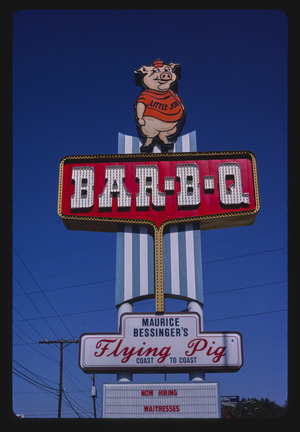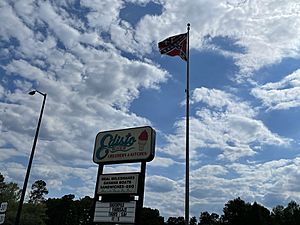Maurice Bessinger facts for kids
Lloyd Maurice Bessinger Sr. (born July 14, 1930 – died February 22, 2014) was an American businessman. He was famous for his BBQ restaurants in South Carolina. He also held strong beliefs about keeping people of different races separate.
Contents
Early Life
Bessinger was born in Orangeburg County, South Carolina on July 14, 1930. He served in the Army during the Korean War. He returned to the United States in 1952.
Maurice's Piggie Park BBQ
In 1953, Bessinger and his brother Joe Jr. opened their first drive-in restaurant. It was called Maurice's Piggie Park. This first restaurant was in West Columbia, South Carolina. By 1968, he had four drive-ins. By 2002, the chain had grown to nine restaurants.
The barbecue from Piggie Park was very popular. Many people thought it was some of the best BBQ in the United States. Bessinger also sold BBQ sauce under the Carolina Gold brand. This sauce included mustard, brown sugar, soy sauce, and vinegar. By 1999, his BBQ business was the largest in the United States.
Segregation Lawsuit
For a long time, Piggie Park restaurants were segregated. This meant that African-Americans were not allowed to eat inside the restaurants. In 1964, Anne Newman, the wife of an African-American minister, sued Piggie Park. Bessinger had refused to let her eat inside his restaurant.
Newman sued under a law called Title II of the Civil Rights Act of 1964. She won a court order against the restaurant chain. This order made them stop refusing service to African-Americans. This case also helped set a rule for future lawsuits. It said that if someone successfully sues for a court order under this act, they can get their legal costs paid.
Confederate Flag Controversy
In 2000, the state of South Carolina stopped flying the Confederate Flag over its capitol building. This happened after a vote earlier that year. In response, Bessinger raised Confederate flags over his own restaurants. He called the flags "a real Christian symbol." He said they represented "fighting tyranny and terror and suppressive government."
Many grocery stores stopped selling his Carolina Gold sauce because of this. Bessinger then sued several grocery chains. These included Bi-Lo, Food Lion, Harris Teeter, Kroger, Piggly Wiggly, Sam's Club, Wal-Mart, and Winn-Dixie. He argued that refusing to sell his products was unfair. He also said it went against his right to free speech. Bessinger asked for $50 million in damages. However, the South Carolina Supreme Court said he could not win his case in 2007.
After Bessinger's children took over the business, they removed these flags. The last one was taken down in 2013.
Orangeburg Flag Location
In 2014, Bessinger sold a small part of his Edisto restaurant property. This small piece of land included a flagpole and a Confederate flag. He sold it to a group called the Sons of Confederate Veterans Rivers Bridge Camp 842 for $5.
The rest of the property was sold in 2015 to Tommy Daras. Daras opened a new restaurant there called Edisto River Creamery & Kitchen. Daras did not pay much attention to the flag at first. But after the Charleston church shooting in 2015, members of the Sons of Confederate Veterans replaced the flag with a much larger one. Daras's business suffered because people thought he supported the flag. He tried to get the flag removed. However, in 2017, the Orangeburg zoning board said the flagpole followed the rules. Daras put the restaurant property up for sale in 2019.
Views on Race
Bessinger was a Baptist. In the Newman lawsuit, he argued that serving African-American customers went against his religious beliefs.
Bessinger believed that "God gave slaves to whites." He also claimed that South Carolina had a gentler "Biblical slavery." In 2000, a newspaper columnist wrote about Bessinger's restaurants. He noted that one paper given out at the restaurant argued that slavery was not always evil. This was because it appeared in the Bible.
Bessinger also did not want flags flown at half-mast after the assassination of Martin Luther King Jr.. He said King had only been in Memphis "to stir hatred, violence, and discord."
Political Involvement
Bessinger ran for a seat in the South Carolina House of Representatives in 1964. He lost by only about 100 votes. He also ran for governor in 1974. That attempt was not as successful. He only received 2.5% of the vote in the Democratic primary.
In 1964, he was the chairman for George Wallace's presidential campaign. In the 1970s, he was also the chairman of the South Carolina Independent Party.
Autobiography
In 2001, Bessinger published his autobiography. It was titled Defending My Heritage. One writer called it "one of the most weirdly entertaining" books. He said it showed an "unusual way of thinking about the South." Another book described it as "the story of a man of humble origins." It said he worked hard to build a big business. It also said he was willing to risk it all for his beliefs.



